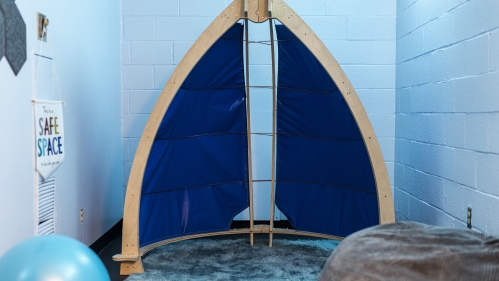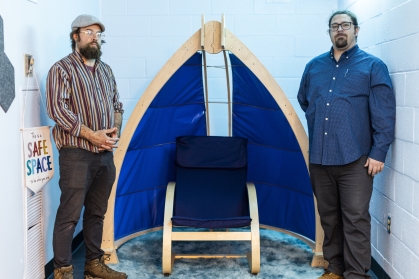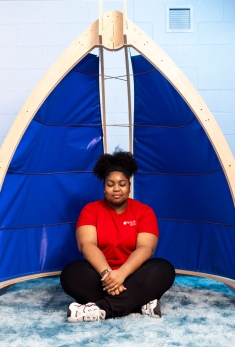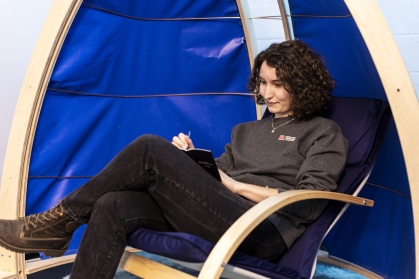Stressed Students Improving Focus and Concentration by Visiting the Zen Den

A new on-campus mindfulness space provides Rutgers–Camden students a calming sanctuary for diffusing external tensions.
Breathe, decompress, and focus will follow. This is the philosophy of two Rutgers–Camden fine art faculty and staff, who have created a mindfulness space in which to release stress and allow positive energy to flow in.
In collaboration with the Student Wellness Center, Lecturer of Art (Sculpture) Daniel Ostrov and Sculpture Lab Technician Grant Whittaker have developed a “meditation pod” that sits within a shared dorm space. Inside, students can escape the hustle and bustle of end-of-semester stress and calmly restore their peace of mind.

The pod, known as a Zen Den, is a sculptural form, or shell, made from natural materials including wood, copper and canvas. The pod makers claim their choice of materials helps to “energetically calm” visitors. Students can sit on the floor under the pod, but the structure is also large enough to accommodate a comfortable chair.
The Zen Den is a sculptural wellness experience intended to diffuse the external stimuli of the surrounding world. This meditation pod creates a welcoming sanctuary space that elevates mindfulness and cultivates awareness for beginners and more experienced practitioners.
Daniel Ostrov
Lecturer of Art (Sculpture)

Whittaker, who has long maintained a meditation practice, said, “The Zen Den experience defines a boundary space for mindfulness practice, which is important for building concentration. It could also help reinforce a regular meditative routine, which is important for building resilience.”
Whittaker and Ostrov brought their skills in architecture, sculpture, and design to the project, aiming to help students concentrate their energy in a space defined and created especially for them.
Ostrov, who is a regatta-level sailor, said the incorporation of sailboat design and the use of shipbuilding materials helps users feel as though calm waters are carrying them away from stress. “It has the grace of a sailboat and in that way, it takes on a life of its own,” he said.
Whittaker brought to the project a Japanese-inspired arch design that ensures the Zen Den is lightweight and requires little hardware in its construction. The wooden frame’s beautifully carved joints can be assembled using a simple mallet. “The pod is highly symbolic but is also purposefully designed as an energy conductor,” Whittaker added.
Located on the second floor of the North Third Street dormitory, the Zen Den space has low lighting for ambiance and gives out a welcoming feel. Two graduate students who stopped by to check out the new space were impressed with the installation.
Kayla Daley, a second-year student in the Master of Social Work program, and Hannah Beck, a graduate student in public affairs and community development, agreed that the Zen Den is a good space for students to decompress.
“Silence is always nice,” said Beck. Daley added that, “The space feels calming, which is good for me, because I’m always in motion.”

Stacy Haynes, a counselor and educator in the Student Wellness Center, said the Zen Den is a proof of concept she is hoping can be rolled out to other campus spaces.
Meditation can help regulate our brain, improve our thinking, and support our emotional well-being. Trauma makes it harder for us to focus, learn, and take in new information.
Stacy Haynes
Licensed Professional Counselor, Student Wellness Center
“The New Jersey Office of Resilience is interested in creating trauma-informed spaces for helping students. Addressing physical regulation and the ability to self-regulate can help soothe the nervous system, which is often impacted by trauma, stress, and anxiety.”
Haynes was pleased to work with Whittaker and Ostrov on the Zen Den project. “This has been a great collaboration between faculty and practitioners like me to promote student wellness on campus.”


